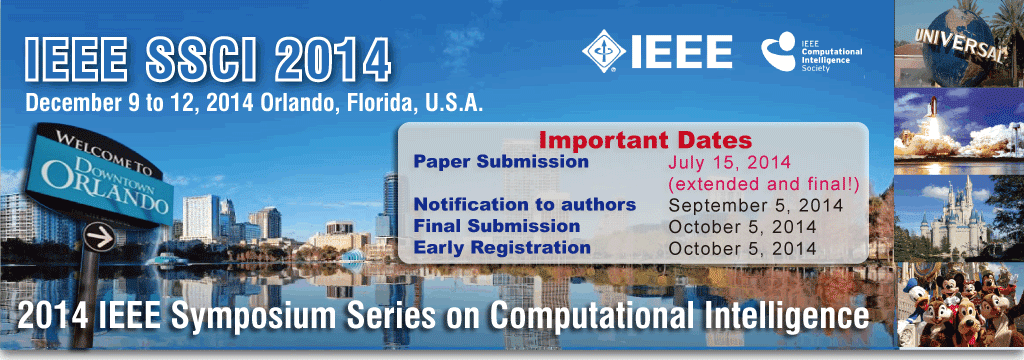- Home
- Final Submission Guidance
- Registration
- Program
- Presentation Guidelines
- Paper Submission
- Important Dates
- Organizing Committee
- Call for Special Sessions
- Call for Papers
- Plenary Speakers
- Keynote Speakers
- Special Sessions
- Doctoral Consortium
- Travel Grants
- Venue
- Accommodation
- Exhibitors
- Local Information
- Contact Us
IEEE Symposium on Robotic Intelligence in
Informationally Structured Space (RiiSS 2014)
The 2014 IEEE Symposium Series in Computational Intelligence
IEEE SSCI 2014
9-12 December 2014, Orlando, Florida. U.S.A
Website:https://ssci2014.webs.com/
The 2014 IEEE Symposium on Robotic Intelligence in Informationally Structured Space (RiiSS2014) will bring together scientists, engineers and students from around the world to discuss the latest advances in the field of robot intelligence within the context of informationally structured space. Recently, the emerging synthesis of information technology (IT), network technology (NT), and robot technology (RT) is one of the most promising approaches to realize a safe, secure, and comfortable society for the next generation. Human-centered systems require, in particular, sophisticated physical and information services which are based on sensor networks, ubiquitous computing, and intelligent artifacts. Information resources and the accessibility within an environment are essential for people and for robots. The environment surrounding people and robots should have a structured platform for gathering, storing, transforming, and providing information. Such an environment is called informationally structured space.
The intelligent computing for the design and use of the informationally structured space should be discussed from various points of view at the same time. An intelligent robot can be an interface connecting between people and informationally structured space to search and provide information. Computational intelligence plays an important role in dealing with perception, action, decision making, planning, adaptation, and learning of robots in the informationally structured space.
Topics
The IEEE Symposium on Robotic Intelligence in Informationally Structured Space (RiiSS 2014) focuses on the intelligence emerging from the synthetic integration of IT, NT, and RT in the informationally structured space. Topics for contributions include, but may not be limited to the following researches:
- Computational Intelligence in Robotics
- Adaptation, Learning and Evolution in Robotics
- Networked Intelligent Robotics
- Multi-Robot Systems
- Swarm Robotics
- Collective Decision Making
- Tele-operated Robots
- Human-Robot Interaction
- Human Centered Systems
- Informationally Structured Space
- Intelligent Space
- Intelligent Ubiquitous Sensor Networks
Call for Papers
Important Dates
Please forward your proposals with detailed abstract and bio-sketches of the speakers to Symposium Co-Chairs and SSCI Keynote-Tutorial Chair, Derong Liu (China).
| Deadline for Paper Submission | July 15, 2014 |
|---|---|
| Acceptance Notification | September 5, 2014 |
| Deadline for Camera-Ready Paper Submission | October 5, 2014 |
Special Session
Computational Intelligence for Cognitive Robotics
(Organizers:Honghai Liu, Naoyuki Kubota )
(Organizers:Takenori, Eri Sato-Shimokawara )
Symposium Co-Chairs
 |
Chu Kiong LooUniversity of Malaya, MalaysiaEmail: ckloo.um@um.edu.my |
|---|---|
 |
Janos BotzheimTokyo Metropolitan University, JapanE-mail: botzheim@sd.tmu.ac.jp |
Program Committee Members
- Laurence Amaral, Federal University of Uberlandia, Brazil
- Valentina Balas, University of Arad, Romania
- Senen Barro, University of Santiago de Compostela, Spain
- Jiangtao Cao, Liaoning Shihua University, China
- Chee Seng Chan, University of Malaya, Malaysia
- Antonio Chella, University of Palermo, Italy
- Ryad Chellali, Institute of Italy Technologies, Italy
- Sung-Bae Cho, Department of Computer Science, Yonsei University, Korea
- Samir Garbaya, ENSAM - Arts et Metiers ParisTech, France
- Dongbing Gu, University of Essex, UK
- Frank Guerin, University of Aberdeen, UK
- Maki Habib, The American University in Cairo, Egypt
- Donggui Han, Wuhan Textile University, China
- Meng Hu, Drexel University, USA
- Yuancan Huang, Beijing Institute of Technology, China
- Ryota Ishibashi, Tokyo Metropolitan University, Japan
- Yinlai Jiang, Kochi University of Technology, Japan
- Zhaojie Ju, University of Portsmouth, UK
- Ming-Yi Ju, National University of Tainan, Taiwan
- Robert Karlsen, US Army – TARDEC, USA
- Graham Kendall, University of Nottingham, Malaysia
- Kyung-Joong Kim, Sejong University, South Korea
- Jong-Hwan Kim, KAIST, South Korea
- Naoyuki Kubota, Tokyo Metropolitan University, Japan
- Daisuke Kurabayashi, Tokyo Institute of Technology, Japan
- Hongliang Li, Inst. of Automation Chinese Academy of Sciences, China
- Hongyi Li, Portsmouth University, UK
- Xinde Li, Southeast University, China
- Chien-Chou Lin, National Yunlin University of Science and Technology, Taiwan
- Alejandro Linares-Barranco, University of Seville, Spain
- Honghai Liu, University of Portsmouth, UK
- Noureddine Manamanni, University of Reims Champagne Ardenne, France
- Hiroyuki Masuta, Kanagawa University, Japan
- Qiinggang Meng, Loughborough University, UK
- Gyula Mester, University of Szeged, Hungary
- Kazuhiro Ohkura, Hiroshima University, Japan
- Gaoxiang Ouyang, Beijing Normal University, China
- Dimokritos Panagiotopoulos, Technological Educational Inst. of West Macedonia, Greece
- Gary Parker, Connecticut College, USA
- Nicolas Pugeault, University of Surrey, UK
- Ulrich Ruckert, University of Paderborn, Germany
- Imre Rudas, Obuda University, Hungary
- Joaquin Sitte, Queensland University of Technology, Australia
- Jens Starke, Technical University of Denmark, Denmark
- Stephen Stubberud, Raytheon, USA
- Chrysostomos Stylios, TEI OF EPIRUS, Greece
- Jiacheng Tan, Portsmouth University, UK
- Kazuyoshi Wada, Tokyo Metropolitan University, Japan
- Shuming Wang, National University of Singapore, Singapore
- Mattias Wahde, Chalmers University of Technology, Sweden
- Kok Wai Wong, Murdoch University, Australia
- Hao Ying, University of Wayne, USA
- Junyang Zhao, Xi'an Research Inst. of Hi-tech, China
Top
Welcome to IEEE SSCI'14 in Orlando, Florida, December 9 to 12, 2014
Copyright © 2014 IEEE Symposium Series on Computational Intelligence

